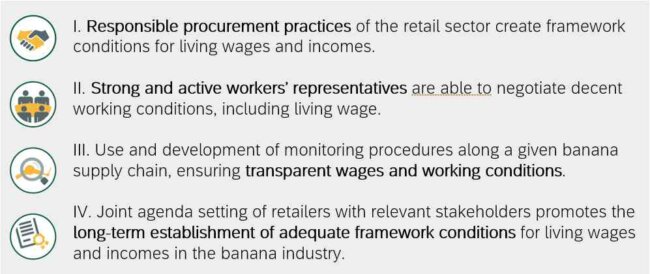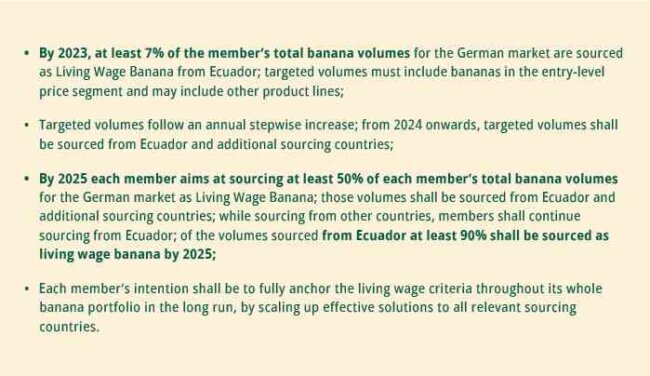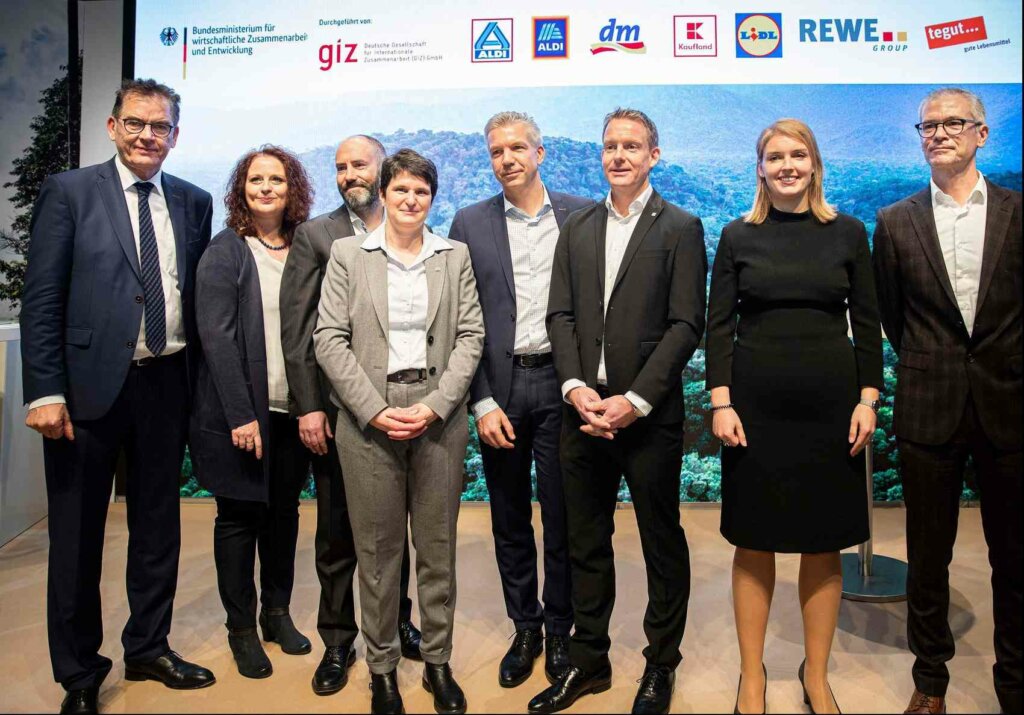In January of 2020 German supermarkets Lidl, Aldi Süd and Nord, Kaufland, Rewe, DM and Tegut signed a voluntary joint agreement on the promotion of living wages and incomes in their agricultural supply chains and formed the German Retailers Working Group on Living Income and Living Wages.
That vision took a step closer to reality last week at a Kick Off event organised by the Initiative for Sustainable Agricultural Supply Chains (INA) at which the Working Group presented the activities of the pilot project on Living Wages in the banana sector.
Their vision for the banana sector
The Working Group is convinced, that in order to effect sustainable change and provide secure livelihoods for local communities, action on Living Wages throughout the entire European market is needed.
Therefore, Working Group members ALDI Nord, ALDI SÜD, Kaufland, Lidl, REWE Group and dm-drogerie markt have agreed to gradually integrate Living Wage criteria into their own brands’ entire banana portfolio. Their goal is to proactively contribute to a transformation of the banana sector through various means.

Living Wage criteria will be developed and piloted in 2022 by means of a participatory dialogue and consultation process with supply chain partners as well as other relevant actors. Definition and implementation of these criteria shall follow the principle of shared responsibility, shared reward and shared risk between the respective actors within individual banana supply chains. Core criteria will encompass responsible purchasing practices and the strengthening of workers’ representation bodies. As of spring 2023 bananas fulfilling Living Wage criteria are expected to be available in retailers’ markets, that include fresh banana.
Banana sourcing volumes complying with Living Wage criteria will be increased continuously over the next few years according to the following previously defined milestones:

First pilot project
Starting point for the implementation of the German retailers’ sector initiative is a pilot project in Ecuador. This first joint project acts as a pilot to understand, test and adjust viable approaches to promote living wages in banana supply chains. In addition, it serves as a blueprint to adopt and expand good practices in further sourcing countries beyond Ecuador.
Ecuador was chosen as a first pilot project, because it is an important, if not the most important, sourcing country for bananas for all Working Group members. The project and related activities are expected to be extended to other sourcing countries in 2023.
Wage gap analysis as a foundation
Although current evidence indicates a relatively small wage gap in Ecuador, detailed information on the wage situation of workers in the banana supply chains of German retailers is not yet available. To obtain a comprehensive overview of the wage situation, Working Group members are analysing wage gaps for as many of their Ecuadorian supplier as possible using the IDH salary matrix and working in close consultation with suppliers and producers. Additionally, all wage data and gaps shall be validated by a third party. A report of the aggregated results is expected to be published in the spring of 2022. Furthermore, by the end of 2022 additional reference countries are planned to be included in the wage gap analysis.
Closing possible wage gaps
If wage gaps are found on a plantation, retailers aim to contribute to closing the gap by paying an individual price premium. This is one of the core elements of the Living Wage criteria. The calculation and payment of the price premium will be done individually in relation to the particular wage gap and the quantities purchased by the respective retailer on the plantation.
To calculate the necessary price premium, while including producers and workers’ representatives, GIZ has developed the “Living Wage Costing Tool“. Based on farm specific wage data, different scenarios for reducing and closing wage gaps are calculated and corresponding price premiums are determined, while also taking into account the specific wage structures of the farm.
The main goal is to support producers in calculating additional labor costs needed to promote living wages and as a result strengthen producers’ negotiating position. In the coming year, the tool will be tested in pilot measures with producers, suppliers, and retailers. Based on the learning experiences of all participants, it will be further developed and continuously improved.
Dialogue and cooperation for fair procurement practices
To develop scalable and verifiable approaches for fair procurement practices as a means of promoting living wages, the Working Group is collaborating closely with various standard-setting organisations. Pilot activities on this measure are planned for the upcoming year, such as ensuring a verifiable transfer of the price premium through the supply chain and setting up payout mechanisms on farm-level.
At the same time workers’ representatives and, where possible, trade unions are foreseen to be trained and strengthened on the farms that supply to working group members. These trainings are to follow a gender-sensitive approach and address the topics of workers’ rights, decent working conditions, and women’s empowerment.
In cooperation with GIZ Ecuador, the Working Group engages in a regular exchange with producers, suppliers, and other relevant stakeholders in Ecuador to include their ideas and perspectives as well as to reflect on the activities of the WG in general. This exchange is to be further consolidated in the coming year.
A welcome development
Banana Link International Coordinator, Alistair Smith, spoke at the event last week, and welcomed these developments, saying “that the collective buying power of these large supermarket chains is starting to be directed to achieving real social and environmental improvements; this is a very positive start to the process of covering costs which have not been paid through prices so far.”
The recognition that workers and their trade union representatives are a vital part of this process is crucial: “Recognising that living wages cannot be decreed but need to be negotiated by social partners and that current wage levels need to be verified by trade unions” makes this government-backed effort really stand out as a cut above the rest,” added Smith.
Photo: Initiative for Sustainable Agricultural Supply Chains
